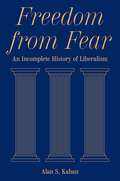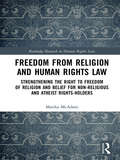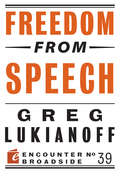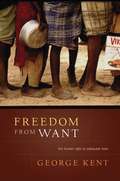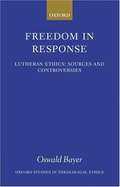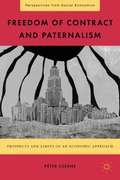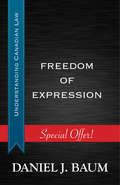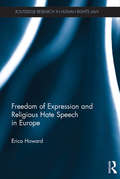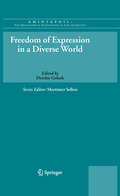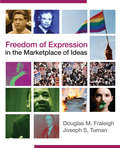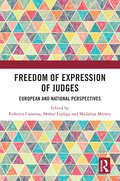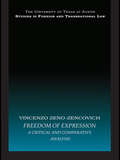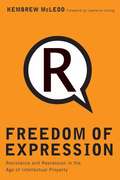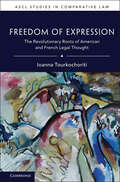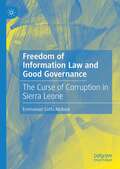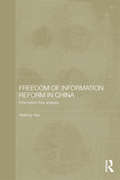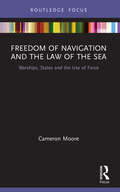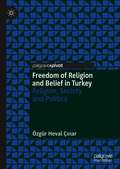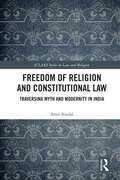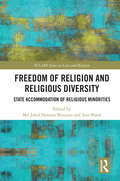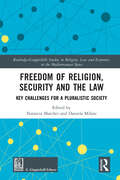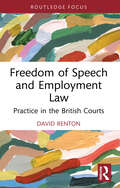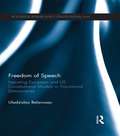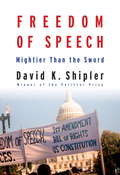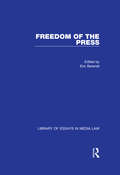- Table View
- List View
Freedom from Fear: An Incomplete History of Liberalism
by Alan S. KahanA provocative new history of liberalism that also provides a road map for today’s liberalsFreedom from Fear offers a striking new account of the dominant political and social theory of our time: liberalism. In a pathbreaking reframing of the historical debate, Alan Kahan charts the development of Western liberalism from the late eighteenth century to the present. Examining key liberal thinkers and issues, Kahan shows how liberalism is both a response to fear and a source of hope: the search for a world in which no one need be afraid.Freedom from Fear reveals how liberal arguments typically rely on three pillars: freedom, markets, and morals. But when liberals ignore one or more of these pillars, their arguments generally fail to persuade. Extending from Adam Smith and Montesquieu to today’s battles between liberals and populists, the book examines the twists and turns of the “incomplete” or unfinished liberal tradition while demonstrating its fundamental continuity. It combines fresh accounts of familiar figures such as Tocqueville and Rawls with discussions of less-famous but pivotal thinkers such as A. V. Dicey and Jane Addams, and explores how liberals have dealt with crucial issues, from debates over male and female suffrage to colonialism and liberal anti-Catholicism.By transforming our understanding of the history of liberal thought and practice, Freedom from Fear provides a new picture of the political creed today: the paths liberals need to follow, the questions they need to answer, and the dead ends they must avoid—if they are to win.
Freedom from Religion and Human Rights Law: Strengthening the Right to Freedom of Religion and Belief for Non-Religious and Atheist Rights-Holders (Routledge Research in Human Rights Law)
by Marika McAdamAlthough human rights belong to all persons on the basis of their humanity, this book demonstrates that in the practice of international human rights law, the freedom to be non-religious or atheist does not receive the same protection as the freedom to be religious. Despite the claimed universality of freedom of religion and belief contained in article 18 of the International Covenant on Civil and Political Rights, the key assertion made is that there is a hierarchy of religion and belief, with followers of major established religions enjoying high protection and low regulation at the top, and atheists and non-believers enduring high persecution and weaker protection at the bottom. The existence of this hierarchy is proven and critiqued through three case study chapters that respectively explore the extent to which non-religious and atheist rights-holders enjoy freedom from proselytism, freedom from hate and freedom from the religions of their parents.
Freedom from Speech
by Greg LukianoffThis is a surreal time for freedom of speech. While the legal protections of the First Amendment remain strong, the culture is obsessed with punishing individuals for allegedly offensive utterances. And academia - already an institution in which free speech is in decline - has grown still more intolerant, with high-profile "disinvitation" efforts against well-known speakers and demands for professors to provide "trigger warnings" in class. In this Broadside, Greg Lukianoff argues that the threats to free speech go well beyond political correctness or liberal groupthink. As global populations increasingly expect not just physical comfort but also intellectual comfort, threats to freedom of speech are only going to become more intense. To fight back, we must understand this trend and see how students and average citizens alike are increasingly demanding freedom from speech.
Freedom from Want: The Human Right to Adequate Food (Advancing Human Rights)
by George KentThere is, literally, a world of difference between the statements "Everyone should have adequate food," and "Everyone has the right to adequate food." In George Kent's view, the lofty rhetoric of the first statement will not be fulfilled until we take the second statement seriously. Kent sees hunger as a deeply political problem. Too many people do not have adequate control over local resources and cannot create the circumstances that would allow them to do meaningful, productive work and provide for themselves. The human right to an adequate livelihood, including the human right to adequate food, needs to be implemented worldwide in a systematic way. Freedom from Want makes it clear that feeding people will not solve the problem of hunger, for feeding programs can only be a short-term treatment of a symptom, not a cure. The real solution lies in empowering the poor. Governments, in particular, must ensure that their people face enabling conditions that allow citizens to provide for themselves.
Freedom in Response: Sources and Controversies
by Oswald BayerThe leitmotif of Freedom in Response, as the title suggests, is a reasoned exposition of the nature of freedom, as it is presented in the Bible and developed by such later theologians as Martin Luther.
Freedom of Contract and Paternalism: Prospects and Limits of an Economic Approach (Perspectives from Social Economics)
by Péter CserneA theoretical discussion and internal critique of mainstream law and economics scholarship, especially as it approaches the issue of paternalism. Cserne discusses how, and to what extent, economic analysis can explain and/or justify the limitations on freedom of contract, with special emphasis on paternalism.
Freedom of Expression
by Daniel J. BaumThis book explains our right to freedom of expression, its limits, and how Canadian courts draw the line. Freedom of expression is a fundamental right protected by the Charter of Rights and Freedoms, which is part of the Constitution of Canada and, as such, the highest law of the land. But it has limits. Peacefully picketing an abortion clinic, so long as patients can come and go, is a protected right, but shouting "Fire!" in a crowded theatre to cause a stampede is a criminal offence. Tied in with issues of free speech are questions such as whether justice delayed is justice denied. If it takes years to bring a matter to court — and especially to the Supreme Court of Canada — how can it be said that there has been a fair consideration of the issues to be decided? As well, must all important constitutional questions, such as freedom of expression, be decided by the courts? Or, is there another way to resolve such issues? How courts reach decisions in such cases is discussed in Freedom of Expression, an objective introduction for all readers to better understand how law and professional ethics impact those of us who would speak publicly as to issues of concern.
Freedom of Expression and Religious Hate Speech in Europe (Routledge Research in Human Rights Law)
by Erica HowardIn recent years, the Danish cartoons affair, the Charlie Hebdo murders and the terrorist attacks in Brussels and Paris have resulted in increasingly strident anti-Islamic speeches by politicians. This raises questions about the limits to freedom of expression and whether this freedom can and should be restricted to protect the religious feelings of believers. This book uses the case law of the European Court of Human Rights to provide a comprehensive analysis of the questions: whether legal prohibitions of religious hate speech violate the right to freedom of expression; and, whether such laws should be used to prosecute politicians and others who contribute to current debates when they use anti-Islam rhetoric. A well-known politician who uses such rhetoric is Dutch politician Geert Wilders. He has been prosecuted twice for hate speech, and was acquitted in the first case and recently convicted in the second. These prosecutions are used to illustrate the issues involved in drawing the line between freedom of expression and religious hate speech. The author argues that freedom of expression of politicians and those contributing to the public debate should not be restricted except in two very limited circumstances: when they incite to hatred or violence and there is an imminent danger that violence will follow or where it stops people from holding or manifesting their religion. Based on this, the author concludes that the European Court of Human Rights should decide, if it is asked to do so, that Wilders conviction for hate speech violates his freedom of expression.
Freedom of Expression in a Diverse World
by Deirdre GolashThe debate over the foundations and boundaries of freedom of speech, once a matter of balancing the individual rights of unpopular speakers against broader social interests, took on a new shape in the 1980s when feminists began to advocate restrictions on pornography and critical race theorists to advocate restriction of certain kinds of hate speech. These challenges to traditional liberalism brought into sharp focus the issues of why we value free speech and how much weight it should be given against competing values. Difficult as it is to resolve these issues domestically, we now face new challenges arising from the increasingly rapid dissemination of information across international borders in an atmosphere of considerable political tension. The riots in response to the publication of Danish cartoons ridiculing Mohammed and the death threats against Salman Rushdie indicate how dramatically the stakes have been raised. At the same time, there is increased concern over discriminatory treatment of sexual minorities, Muslims, and immigrants. Against this background, the essays in this volume seek to illuminate why we value freedom of speech and expression and how this freedom can be weighed against other values, such as multicultural sensitivity, the rights of racial and sexual minorities, and the prevention of violence, both domestically and internationally.
Freedom of Expression in the Marketplace of Ideas
by Joseph S. Tuman Dr Douglas FraleighA comprehensive guide to effective participation in the public debate about our most indispensable right: freedom of expressionEncouraging readers to think critically about freedom of speech and expression and the diverse critical perspectives that challenge the existing state of the law, this text provides a comprehensive analysis of the historical and legal contexts of the First Amendment, from its early foundations all the way to censorship on the Internet. Throughout the book, authors Douglas M. Fraleigh and Joseph S. Tuman use the "Marketplace of Ideas" metaphor to help readers visualize a world where the exchange of ideas is relatively unrestrained and self-monitored. The text provides students with the opportunity to read significant excerpts of landmark decisions and to think critically about the issues and controversies raised in these cases. Students will appreciate the treatment of contemporary issues, including free speech in a post-9/11 world, free expression in cyberspace, and First Amendment rights on college campuses. Features: Demystifies free speech law, encouraging readers to grapple with the complexities of significant ethical and legal issues Sparks student interest in "big picture" issues while simultaneously covering important foundational material, including incitement, fighting words, true threats, obscenity, indecency, child pornography, hate speech, time place and manner restrictions, symbolic expression, restrictions on the Internet, and terrorism. Includes significant excerpts from landmark freedom of expression cases, including concurring or dissenting opinions where applicable, to help students become active learners of free expression rights Offers critical analysis and alternative perspectives on free expression doctrines to demonstrate that existing doctrine is not necessarily ideal or immutable Includes a global perspective on free expression including a chapter on international and comparative perspectives that helps students see how the values of different cultures influence judicial decisions
Freedom of Expression of Judges: European and National Perspectives
by Federica Casarosa, Mohor Fajdiga and Madalina MoraruThis book addresses the impact of developments surrounding the freedom of expression of judges by building on the experience of judges themselves, legal practitioners and academics across Europe. Like everybody, judges enjoy freedom of expression. However, historically, there have been starker limitations to the free speech of judges compared to ordinary citizens, the rationale being to safeguard judicial independence, impartiality and public trust in the judiciary. Where exactly the boundary lies is a highly complex question. The recent developments in Europe have rekindled the dilemma of guaranteeing freedom of expression to judges. The rule of law crisis has led many judges to speak out against the attacks of autocratic governments targeting judges and courts. The rapid expansion of the digital world has opened up new channels of communication, and the growing role of courts in society has expanded the reach of courts to practically any social issue, even the most polarised. This work critically analyses the recent jurisprudence of the Court of Justice of the EU and the European Court of Human Rights, its reception at the national level and the contribution of national judiciaries to the discussion pervading the European judicial space. It seeks to raise awareness that judicial speech is a multifaceted phenomenon shaped by complex legal and social considerations worth further exploration. The book will be of interest to academics, researchers, and policy-makers working in the areas of Human Rights Law, Constitutional Law and Politics, and Comparative Law.
Freedom of Expression: A critical and comparative analysis (UT Austin Studies in Foreign and Transnational Law)
by Vincenzo Zeno-ZencovichThis book takes a multidisciplinary approach to the issues surrounding freedom of expression, looking at the current legal position in a number of European countries as well as engaging with the wider debates on the topic amongst sociologists, political scientists and economists. In the book Vincenzo Zeno-Zencovich addresses recent developments which have had a bearing on the debate including the changes in communication brought about by the internet, and the growing role of the European Union and the Council of Europe.
Freedom of Expression: Resistance and Repression in the Age of Intellectual Property
by Kembrew McleodThis is about the ways in which intellectual property laws have been used to privatize all forms of expression including the right of speech.
Freedom of Expression: The Revolutionary Roots of American and French Legal Thought (ASCL Studies in Comparative Law)
by Ioanna TourkochoritiTwo legal systems founded from similar Enlightenment philosophical and political values use state coercion differently to regulate a core liberty: the freedom of expression. This comparative study of France and the United States proposes a novel theory of how the limits of freedom of expression are informed by different revolutionary experiences and constitutional and political arrangements. Ioanna Tourkochoriti argues that the different ways freedom of expression is balanced against other values in France and the United States can be understood in reference to the role of the government and the understanding of republicanism and liberty. This understanding affects how jurists define the content and the limits of a liberty and strike a balance between liberties in conflict. Exploring both the legal traditions of the two countries, this study sheds new light on the broader historical, social and philosophical contexts in which jurists operate.
Freedom of Information Law and Good Governance: The Curse of Corruption in Sierra Leone
by Emmanuel Saffa AbdulaiThis book argues that Sierra Leone’s ten-year civil conflict demonstrates the criticality of freedom of information (FOI) as a facet of good governance where corruption thrives, spanning both public and private sectors, if Sierra Leone’s continued security and stability are to be ensured. It argues that it was the absence of an anti-corruption tool like FOI and its attendants, transparency, and accountability, in governance generally, and in the area of the extractive industry in particular, that lead to other social phenomena which directly sparked the war. It proffers that for the continued consolidation of peace, security, stability and development in Sierra Leone, transparency and accountability must be ensured by protecting and implementing the demand driven anti-graft FOI.Straddling the disciplines of law, political science, public policy, and history, the book’s major premise is that it was the absence of FOI in the area of governance and the extractive industry, which enabled politicians, civil servants and the politically connected to ransom and exploit Sierra Leone’s mineral resources for their own profit with impunity, a state of affairs which led to underdevelopment, state collapse and an embittered civil populace especially the youth. The book postulates that as such any attempt to ensure long-term peace in Sierra Leone, should seek to avoid replicating the conditions that gave rise to that gruesome conflict- elites expropriation of national resources through endemic graft. The book proposes the comprehensive and effective implementation of the Right to Information Act 2013.
Freedom of Information Reform in China: Information Flow Analysis (Routledge Law in Asia)
by Weibing XiaoFreedom of Information (FOI) in China is often perceived as a recent and intriguing phenomenon. This book presents a more complex and detailed understanding of the evolution of FOI in China, using information flow analysis to explore the gradual development of government receptivity to FOI in an information environment through time. The book argues that it is necessary to reassess the widely divergent origins of FOI reform in China, and asserts that social, political and legal factors should have central roles in understanding the development of FOI in China. The book uses information flow analysis to find that FOI reform in China formed part of a much longer process of increased transparency in the Chinese information environment, which gradually shifted from the acceptance of proactive disclosure to that of reactive disclosure. FOI thus has become a beneficiary of this gradual transformation of the Chinese information environment.
Freedom of Navigation and the Law of the Sea: Warships, States and the Use of Force (Routledge Research on the Law of the Sea)
by Cameron MooreThere has been a recent increase in clashes between warships asserting rights to navigate and states asserting sovereignty over coastal waters. This book argues for a set of rules which respect the rights of coastal states to protect their sovereignty and of warships to navigate lawfully, whilst also outlining the limits of each. The book addresses the issue of the clash between warships and states by considering the general principles applying to use of force in the law of the sea and the law of national self-defence. It focuses on the right of coastal states to use force to prevent passage of warships which threaten their sovereignty, with particular reference to the specific maritime zones, as well as by warships to ensure passage or to defend themselves. The book also assesses the extent to which the law of armed conflict may be applicable to these issues. The conclusion draws together a set of rules which take account of both contemporary and historical events and seeks to balance the competing interests at stake. Providing a concise overview of the enduring issue of freedom of navigation, this book will appeal to anyone studying international law, the law of the sea, security studies and international relations. It will also be of interest to naval, coast guard and military officers as well as government legal advisors.
Freedom of Religion and Belief in Turkey: Religion, Society and Politics
by Özgür Heval ÇınarThe freedom of thought, conscience, and religion, from which stem the tenets of pluralism, tolerance, and open-mindedness, are some of the most basic freedoms of a democratic society. This book illustrates the current state of the freedom of religion or belief in Turkey and the challenges and complex problems facing it, concentrating on the most topical issues: being compelled to reveal one’s religion and beliefs on the national identity card; the right of conscientious objection and conscientious objectors; compulsory religious education; recognition of faith groups and the opening of places of worship; and using and wearing religious symbols and dress in the public sphere.
Freedom of Religion and Constitutional Law: Traversing Myth and Modernity in India (ICLARS Series on Law and Religion)
by Amit BindalThis book investigates the intersection of religion and modern law. It explores how secular courts encounter the religious or mythical question which is disavowed by modern institutions. It questions the private-public dichotomy of liberal constitutionalism which relegates religion to the private sphere. It argues that in ex-colonial societies like India which are foundationally and diversely religious, the courts need to work through and engage with the difficulties and complexities posed by their continual encounter with the question of religion rather than re-affirming the myth of separation of law and myth, state and religion. This work demonstrates that any other approach leads to its repression and resultant reemergence in various forms. Such an approach of working through religious categories will be effective in the struggle against religious fanaticism that has seen a resurgence in contemporary times. The book will be a valuable resource for students and academics working in law, religious studies, history and political science.
Freedom of Religion and Religious Diversity: State Accommodation of Religious Minorities (ISSN)
by Md Jahid Hossain Bhuiyan Ann BlackToday, pluralism is increasingly the norm and can be seen as a permanent characteristic of modernity. As seen in world events, religion has not become irrelevant but more diverse, giving rise to a complex web of religion and belief minorities, together with intra-plural majorities. Nations seek ways to implement the ideal of freedom of religion, but as this book shows, whether East or West, in the global North or the South, there is no simple formalism for accommodating religious diversity. Different faith communities have competing needs and demands for the same social space, with tensions inevitably arising. This book highlights responses from liberal democracies which enshrine secularism into their constitutions to other constitutions where religion and ethnic identity are enshrined to prioritise their ethno-religious majority. Western and Asian countries encounter different obstacles and challenges. With analysis from 19 international scholars, the book explores different obstacles and responses to accommodation of religious minorities in a range of jurisdictions. In a globalised world, it will be invaluable for comparative legal scholars, for law and religion scholars, researchers and students, and decision-makers, e.g., governments, non-governmental organisations, and for those who seek to better understand the challenges of our time.
Freedom of Religion, Security and the Law: Key Challenges for a Pluralistic Society (Routledge-Giappichelli Studies in Religion, Law and Economics in the Mediterranean Space)
by Natascia Marchei Daniela MilaniThis collection addresses many of the issues arising from the management of religious and cultural diversity in a multicultural society and refers to the complex relationship between the right to religious freedom and security. In recent decades, and particularly since September 2001, the right to religious freedom, which has hitherto been widely protected, has come up against a significant challenge in terms of security, or rather, in the subjectively and publicly perceived feelings of security. This book collects original theoretical, legal and comparative contributions addressing several implications for the right to freedom of religion or belief through the lens of security. It offers a new key to understanding how to manage the processes of integration of religious diversity in multifaith societies. Written by leading experts in the area, the work reveals the importance of avoiding simplistic conclusions and unfounded prejudices about religious freedom, and of limiting restrictive or repressive interventions to situations of genuine danger. The book will be an essential resource for researchers, academics and policy-makers working in the areas of Law and Religion, Human Rights Law and Security Studies.
Freedom of Speech and Employment Law: Practice in the British Courts
by David RentonThe law relating to freedom of speech has grown faster than any other area of employment law over the past decade. Press controversies over online speech, disputed claims to the Equality Act, and allegations of no-platforming have all had the effect of making this the most dynamic area of workplace law. This book provides an introduction to this changing area of law in Great Britain. The first part of the book explains the overarching principle of employment and free speech law; the second half provides detailed case studies in relation to the specific examples that most commonly come before the courts. The book will be an essential reference for students, academics, and professionals working in the areas of Employment Law, Human Rights Law, and Contract Law. The British example will be of interest to an international readership.
Freedom of Speech: Importing European and US Constitutional Models in Transitional Democracies (Routledge Research in Constitutional Law #13)
by Uladzislau BelavusauThis book considers the issue of free speech in transitional democracies focusing on the socio-legal developments in the Czech Republic, Hungary, and Poland. In showing how these Central and Eastern European countries have engaged with free speech models imported from the Council of Europe / EU and the USA, the book offers valuable insights into the ways States have responded to challenges associated with transformation from communism to Western democracy. The book first explores freedom of expression in European and American law looking particularly at hate speech, historical revisionism, and pornography. It subsequently enquires into the role and perspectives of those European (mandatory) and US-American (persuasive) models for the constitutional debate in Central and Eastern Europe. The study offers an original interpretation of the "European" model of freedom of expression, beyond the mechanisms of the Council of Europe. It encompasses the relevant aspects of EU law (judgments of the Court of Justice and the harmonised EU instruments) as mandatory standards for courts and legislators, including those in transitional countries of Central and Eastern Europe. The book argues for de-criminalisation of historical revisionism and pornography, and illuminates topics such as genocide denial, the rise of Prague and Budapest as Europe’s porno-capitals, anti-Semitism and anti-Gypsyism, religious obscurantism and homophobia, virulent Islamophobia, and the glorification of terrorism. The research methodology in this study combines a descriptive case law assessment (comparative constitutional, public international, and EU law) with a normative critique stemming from post-structuralist scrutiny, rhetoric, postmodern legal movements, legal history, history of ideas, and art criticism. This book will be of interest to students and scholars of, comparative constitutional law, law and society, human rights and European law as well as political philosophers.
Freedom of Speech: Mightier Than the Sword
by David K. ShiplerA provocative, timely assessment of the state of free speech in America With his best seller The Working Poor, Pulitzer Prize winner and former New York Times veteran David K. Shipler cemented his place among our most trenchant social commentators. Now he turns his incisive reporting to a critical American ideal: freedom of speech. Anchored in personal stories--sometimes shocking, sometimes absurd, sometimes dishearteningly familiar--Shipler's investigations of the cultural limits on both expression and the willingness to listen build to expose troubling instabilities in the very foundations of our democracy. Focusing on recent free speech controversies across the nation, Shipler maps a rapidly shifting topography of political and cultural norms: parents in Michigan rallying to teachers vilified for their reading lists; conservative ministers risking their churches' tax-exempt status to preach politics from the pulpit; national security reporters using techniques more common in dictatorships to avoid leak prosecution; a Washington, D.C., Jewish theater's struggle for creative control in the face of protests targeting productions critical of Israel; history teachers in Texas quietly bypassing a reactionary curriculum to give students access to unapproved perspectives; the mixed blessings of the Internet as a forum for dialogue about race. These and other stories coalesce to reveal the systemic patterns of both suppression and opportunity that are making today a transitional moment for the future of one of our founding principles. Measured yet sweeping, Freedom of Speech brilliantly reveals the triumphs and challenges of defining and protecting the boundaries of free expression in modern America.From the Hardcover edition.
Freedom of the Press (Library of Essays in Media Law)
by Eric BarendtBringing together the most seminal articles written by leading international experts, this volume discusses all aspects of freedom of the press. The papers in the first part of this volume discuss the meaning of press freedom and its relationship to freedom of speech, while those in the second part discuss the extent to which self-regulation is a satisfactory alternative to legal controls. The essays in parts III and IV explore the various solutions adopted in the USA and in some Commonwealth countries to balancing the freedom of the press and other media against the laws of libel and privacy. They discuss, among other issues, the question whether courts should apply the same constitutional principles to privacy actions as those developed in libel law and how far celebrities are entitled to claim privacy rights when they are photographed in public places.
